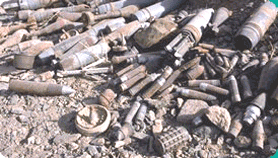|

|
|||||||||||||||

|

|

|

|

|

|

|

|

|

|

|


 |
 |
 |
 |
|
EXPLOSIVE REMNANTS OF WAR - CLUSTER MUNITION COALITION
BackgroundEXPLOSIVE RICOCHET Organised by Pax Christi Netherlands The Hague, 11-13 November 2003 Cluster bombs and other explosive remnants of war are claiming thousands of lives not only during armed conflict but also long after the fighting has ended and have a prolonged impact on development, rendering precious agricultural land hazardous or unusable. Civilians, particularly children, make up the overwhelming majority of post-conflict casualties. Often, a single incident will claim multiple victims and survivors of an explosion typically suffer serious fragmentation injuries. Afghanistan, Angola, Bosnia and Herzegovina, Colombia, Croatia, northern Iraq, Laos, and Sudan are among the most affected regions. The international community is beginning to acknowledge the extent of the humanitarian problem. States Parties to the 1980 Convention on Conventional Weapons have established a Group of Governmental Experts to "discuss ways and means to address the issue of Explosive Remnants of War." This group, which met three times during 2002 (in May, July, and December), has been tasked with identifying the types of munitions that could cause humanitarian problems after a conflict and measures that could minimise the risks to civilians, and considering whether new international law is needed to tackle the problem. But the input from the field, where explosive remnants of war (ERW) are wreaking havoc, has so far been minimal. Experiences from development workers, clearance specialists, surgeons, and awareness experts have not had an opportunity to influence the development of international policy and practice, law and funding in response to the ERW threat. Therefore Pax Christi Ireland, along with other organisations concerned by the humanitarian effects of explosive remnants of war, convened an international conference, as a first step towards remedying that deficiency. The conference, organised by Pax Christi Ireland, took place in Dublin last April. The Launching Conference in The Hague
TThe campaign knows two aims: embedding in international law the responsibilities of parties with regard to ERW, and binding the use of cluster munitions (CM) by universal humanitarian standards. Regarding CM, the campaign aims to restrict the use and production, as well as trade in cluster munitions. A launch conference has been convened in the Netherlands. Here the organisational structure of the campaign will be decided upon and consequently the first board will be chosen and mandated. Other relevant actors, like NGOs from all over the world will be part of, and commit themselves to the campaign. National co-ordinators/ ERW monitors will be appointed. And more work on the development of an ERW- monitor will be done, comparable to the landmine monitor. |


